Machine learning allows computers to make sense of the extreme amounts of data that’s too much for humans to understand, and it’s currently one of the quickest growing sectors in information technology.
Specialists in machine learning are becoming highly sought after, with big tech companies offering generous salaries to any trained professional willing to join their team. As of the writing of this article, Google has 328 open job positions related to machine learning, many of which are above $100,000 per year. The job market demand for machine learning is there, and it’s growing. All you need to do is to develop your skills and competence in the field. Learning a highly technical field such as machine learning will not be easy, but with the right mindset, it’s more than possible.
From the top-rated courses on this list, you can expect to learn all there is to know about machine learning algorithms. Topics such as neural networks, data science algorithms, artificial intelligence, and of course – lots of coding! You can also expect to see linear regression models, logistic regression models, decision tree learning, and much, much more.
Here at E-Student, we place the highest value on courses that are practice-based. Instead of taking lectures on theoretical concepts day in and day out, we prefer to get our hands dirty with programming algorithms and a little quiz every now and then. We also love hands-on student projects and strong mentorship whenever possible, so you can expect that to be a common theme in our picks for the best machine learning course.
Best Machine Learning Courses
Best Overall Course: Intro to Machine Learning with TensorFlow (Udacity)
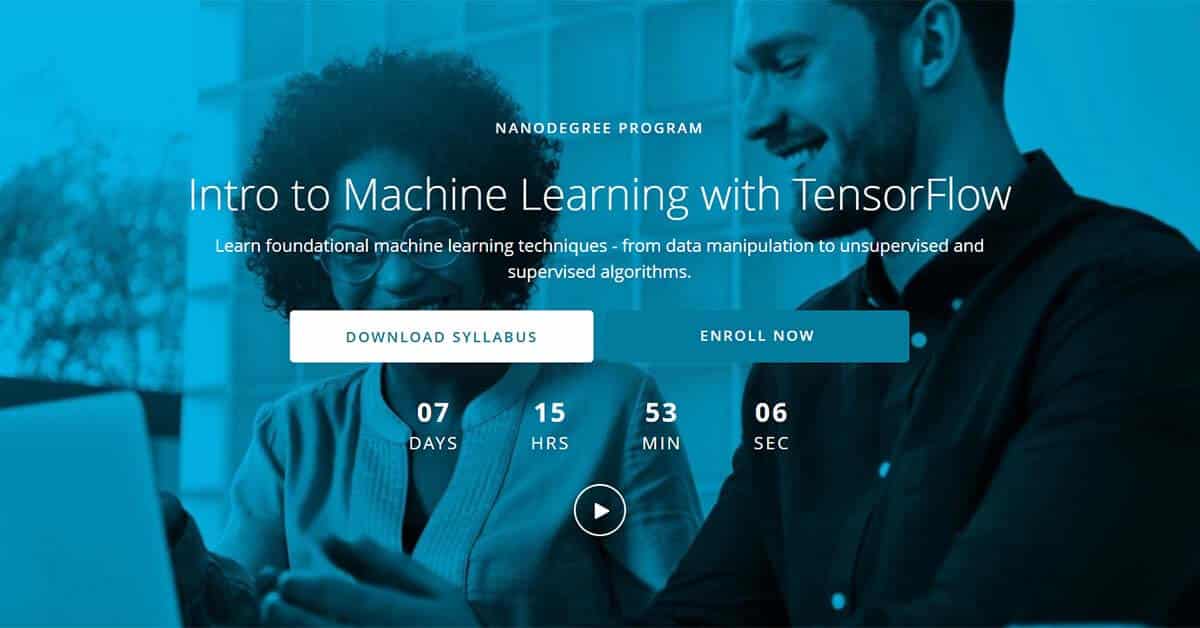
- Great intro to the technical aspects of machine learning
- Career support and mentorship from industry professionals
- Provides workable and presentable practical projects
Cons
- Requires a basic understanding of Python
Udacity offers three courses in machine learning, each aimed at different levels of experience:
- Intro to Machine Learning with TensorFlow. This online course is ideal for beginners who are looking to build foundational knowledge in machine learning. Intermediate Python knowledge (~40 hours) together with basic knowledge in probability and statistics is recommended but not required. Udacity also offers an “Intro to Programming” course, which teaches all the recommended prerequisite material for this machine learning course. There is also an alternative flavor available for those who prefer working with a different tool: “Intro to Machine Learning with PyTorch.”
- Machine Learning Engineer. This online course is considerably more advanced than the previous one, and so are the requirements. Students who wish to take this course need to have proficiency not only in Python but also in machine learning algorithms. Our recommendation – start off with “Intro to Machine Learning” and then continue with “Machine Learning Engineer,” as the two training programs complement each other perfectly.
Udacity’s beginner-oriented course, “Intro to Machine Learning,” covers:
- Using Python & SQL for data access & analysis from different data sources.
- Building predictive models using both unsupervised & supervised machine learning tools & techniques.
- Performing feature engineering to improve current machine learning models.
- Optimizing, tuning, and improving algorithms according to various metrics.
- Comparing the performances of learned models using various metrics.
As the curriculum shows, the course material here is still highly technical, despite it being a machine learning course aimed at beginners. Therefore, we suggest that you start off with developing the prerequisite skillsets mentioned earlier (Python, probability, statistics) before attempting this course.
Udacity’s advanced machine learning online course, “Machine Learning Engineer,” covers the following topics:
- Building and testing machine learning Python codes.
- Building predictive models using various unsupervised & supervised machine learning tools & techniques.
- Cloud deployment terminologies and best practices.
- Using Amazon SageMaker for deploying machine learning models.
- A/B testing different deployed models and evaluating their performance.
- Utilizing an API for deploying a model to a website in a way that it responds to user input dynamically.
- Updating deployed models to respond to changes in the underlying data source.
In addition, the two courses will teach you how to create real-life projects in the field of machine learning. Being able to create machine learning projects independently is highly valuable. That is because independently developed projects can be shown to potential employers to demonstrate expertise. No matter the industry, job applicants who have a real portfolio of projects under their belt will always be chosen first, compared to those candidates with purely theoretical knowledge.
Additionally, Udacity’s machine learning courses will provide you with a clear overview of the existing career opportunities in the industry.
With support from industry professionals, highly in-depth course material, and actionable exercises, these two programs are worth any budding coder’s time and effort. Start off with the basics of machine learning with the Intro to Machine Learning certification program. Then, take your expertise one step further by learning how to create innovative machine learning programs and building your very own portfolio by taking the Machine Learning Engineer certification program. Overall, these two are fantastic machine learning courses that work the best when taken consecutively. If you’re a beginner with some basic Python knowledge, then these two will be the best machine learning courses for you to take.
Best Free Course: Machine Learning Specialization (Coursera x Stanford & DeepLearning.AI)
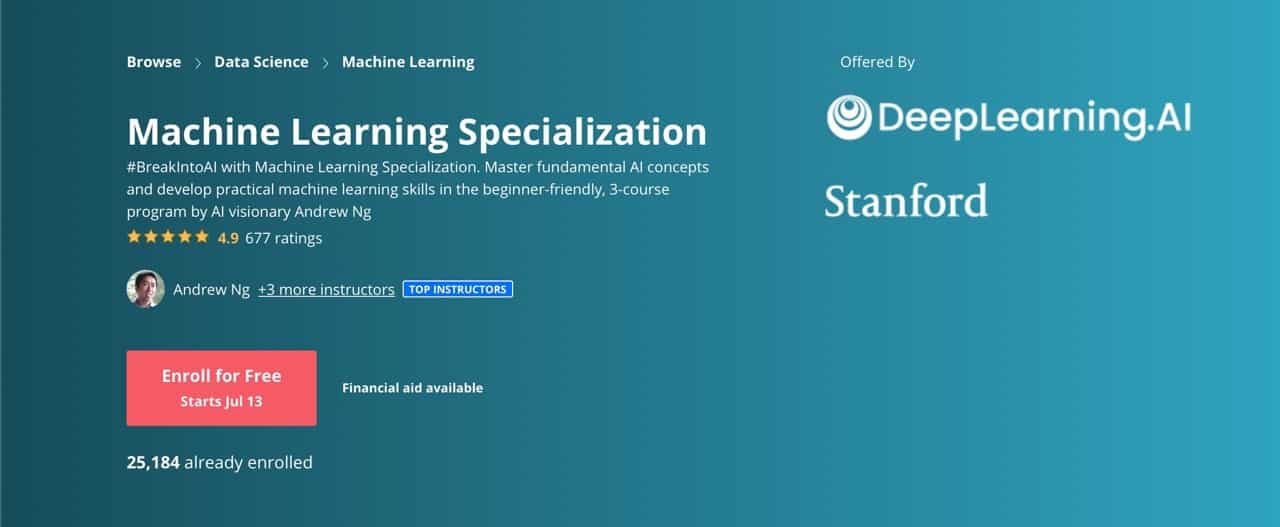
$100 USD off your first year of Coursera Plus Annual (expires 1 April 2024)
- The course is free to audit
- Taught by a real expert of machine learning models
- One of the most popular MOOCs of all time
- Recently updated and expanded in 2022
- Beginner-friendly syllabus
Cons
- The free audit track does not include all features and does not give you a certificate
If the name “Andrew Ng” doesn’t ring a bell for you, I’ll give you a quick rundown as he really is the soul of this course. Andrew Ng is the co-founder of Coursera, ex-director of Stanford’s AI Lab, head of the AI Fund, and former VP of Baidu. The list goes on and on, but I’ll stop here. What matters most is that he is one of the most recognizable names in the AI industry, and there is no better person than him to learn AI and machine learning from.
The previous iteration of the “Machine Learning Specialization” had a nearly perfect 4.93/5 rating on Coursera, with nearly 5 million learners, this course is in a league of its own. It is one of the three initial courses that led to the massive success of Coursera, and it’s been updated with new information on a constant basis. The massive popularity of this course should not come as a surprise to anyone who is a graduate of it. The course has been updated and expanded in 2022 to summarize the advances made over the past ten years. Even if you removed the highly valuable Stanford certificate from the picture, you’d still be left with a well-built, easy to follow, and highly influential machine learning class. But, of course – the Stanford ML certificate is a perfect icing on the cake.
Another advantage of this machine learning class is that it can be taken by anyone regardless of experience level. It’s meant to be suitable for everyone interested in how machine learning techniques work, and while prior computer science and programming experience will be beneficial, it’s not a must by any means. For beginners and experts alike, this is one of the very best machine learning courses one can take, especially with the 2022 update allowing it to keep up with the fast-paced nature of technical innovations in the world of machine learning.
Best Job Guarantee Course: Machine Learning Career Track (Springboard)

- Job offer guaranteed by Springboard
- Curriculum covers all major topics in machine learning
- One-on-one mentorship with machine learning engineers
Cons
- Prior experience in software engineering required for admission
- Expensive
Springboard’s “Machine Learning Bootcamp” is designed for students who already have a solid foundation in software engineering and who want to develop further knowledge in machine learning. Only those who can pass a programming challenge provided by Springboard will be eligible for admission.
A wide range of topics is covered in this machine learning certification program. Some of the topics which are covered in the curriculum are:
- Overview of AI and Machine Learning Engineering Stack
- Data Wrangling at Scale and Statistics for AI
- Foundations of Machine Learning
- Deep Learning
This online course finishes off with each student developing a capstone project – a full-scale machine learning API application. The application needs to be fully functional and approved by the Course instructors, who are true experts in the field of machine learning. This capstone project will be your foot-in-the-door when landing a machine learning job, as you can use it to demonstrate your practical know-how and expertise. The project takes approximately 100 hours to finish, and the complexity of it is one of the main reasons why Springboard chooses all students admitted into the course with the utmost care.
This machine learning certification will be the most difficult to finish out of all the courses on this list. An intermediate level of knowledge in programming is required for admission, and the course material will be difficult to chew through if you’re not fully dedicated and motivated to start a career in the field of machine learning. The students who do manage to finish this online course, though, will be rewarded appropriately. All students who graduate will be certified experts in machine learning, and they will be rewarded with a guaranteed job proposal from a company specializing in machine learning. All things considered, Springboard’s Machine Learning Career Track is one of the best machine learning courses available online (as long as you have some prior experience in programming).
Machine Learning Certification Course (Simplilearn)
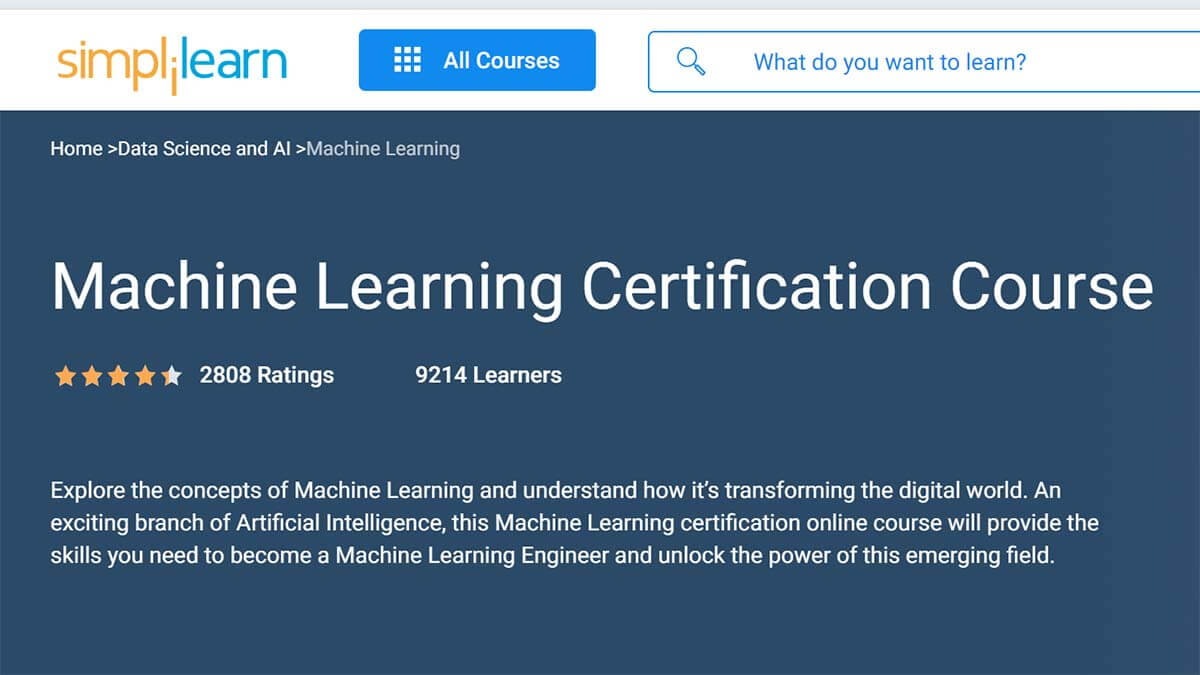
- Taught by industry experts
- Includes four end-to-end student projects
- Focuses on practical knowledge rather than theory
Cons
- Pricey considering it only has 7 hours of content
This online course was built with hands-on experience in mind, and the whole course is structured to combine theory with practice at every step. During every lecture, you will have to utilize theoretical knowledge in order to create working machine learning applications.
Here are some of the topics covered in Simplilearn’s Machine Learning Certification Course:
- Supervised & unsupervised learning
- Recommendation engines and time series modeling
- Statistical and heuristic aspects of machine learning
- Various Python-based machine learning models
In addition, all students who take this online course will create four end-to-end projects, thus solidifying their practical knowledge even further. As a result, students who graduate from this program will be able to program various types of machine learning models independently.
Simplilearn’s Machine Learning Certification Course is a comprehensive and well-structured online course. It does an excellent job of covering all major topic areas in machine learning, and the inclusion of practical student projects into the curriculum is very important. All in all, this is a very high-quality machine learning course, and we can give it a strong recommendation. It is considerably shorter than many of the alternative courses on this list, but the mandatory student projects add exceptional value to an otherwise short course.
Machine Learning with JavaScript (Udemy)
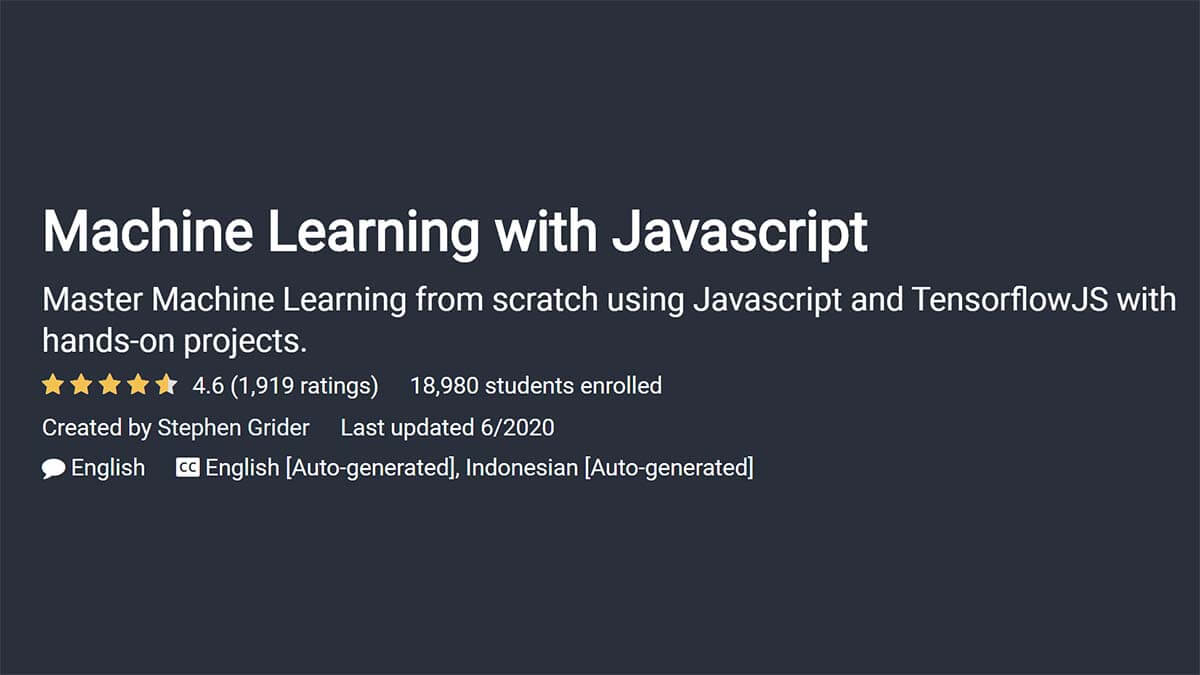
New customer offer! Top courses from $14.99 when you first visit Udemy (expires 31 March 2024).
- Good alternative to coders who know JavaScript instead of Python
- Clear explanations of machine learning algorithms
- Does not explain the foundational knowledge of ML in a deep way
Cons
- Inaccessible to those who only know Python
The “Machine Learning with Javascript” course from Udemy is perfect for programmers who are familiar with JavaScript and want to branch out into machine learning applications. A basic understanding of terminal and command line usage is necessary for completing this course.
This is a course that heavily leans on the practical side of machine learning, preferring to show rather than tell. You’ll learn the exact methods used to make up the foundations of machine learning like linear algebra, and you will learn how to create your own JavaScript machine learning programs.
A large portion of developers prefer to create programs using Python, but there are still some who prefer using JavaScript. Machine learning algorithms are now easily accessible to these engineers with the help of this course, as it teaches students the basics using machine learning in conjunction with JavaScript.
The coding language used in this course is vastly different from most machine learning courses out there. As a result, this course becomes a good alternative to those who want to learn machine learning online without the necessity of using Python. While Python seems to be the most popular choice for creating machine learning algorithms, it’s definitely not the only choice, and this course proves it. All in all, this course does not go as deep into the fundamentals of machine learning as some of the alternative top picks, but it’s still a fantastic resource which serves its own niche audience of JavaScript users very well.
Google Cloud Platform Big Data and Machine Learning Fundamentals (Coursera)
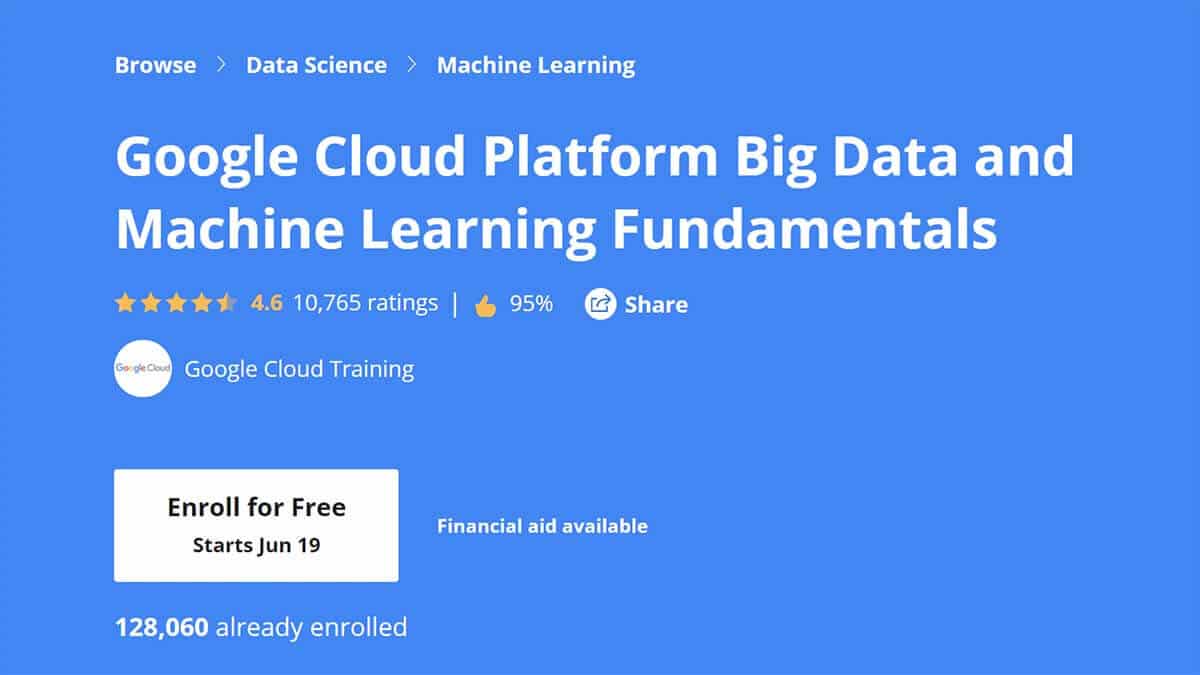
$100 USD off your first year of Coursera Plus Annual (expires 1 April 2024)
- Comprehensive insight into machine learning with Google Cloud
- Provides a good overview of big data
- Teaches core values of machine learning and oversight
Cons
- Limited to the Google Cloud platform
The “Google Cloud Platform Big Data and Machine Learning Fundamentals” is targeted towards machine learning engineers who are looking to build their expertise with Google’s cloud services. This course is not very beginner-friendly, as it requires students to have at least 1 year of experience in the course subjects.
Aside from the basics of machine learning, this course dives deeper into the data processing aspect of machine learning. You will be taught how to create an infrastructure that can help your program understand the data it is working with. In latter parts of the course, you can even build your own neural network as a proof of concept for your theory classes.
Most of the course material covered here is related to the Google Cloud Platform, so if you don’t plan on using Google’s cloud services for your machine learning applications, you are likely better off with another course.
If you are, however, interested in the Google Cloud Platform, then you will find plenty to learn from this course. You will be taught subjects such as:
- Differentiating the different big data and machine learning toolsets offered by Google
- Migrating existing services over to the Google Cloud Platform
- Employing BigQuery and Cloud Datalab for interactive data analysis
- Creating neural networks with TensorFlow
- Differentiating the different data processing services of the Google Cloud Platform
Any engineer that uses the Google Cloud Platform should take this course. It’s filled with highly useful information about the platform, and it’s an undisputed asset that can help any data scientist understand the intricacies of data processing through the tools offered by the Google Cloud Platform. The course is rather limited to Google’s cloud platform, though, so keep this in mind before starting the course.
Machine Learning by Columbia University (edX)
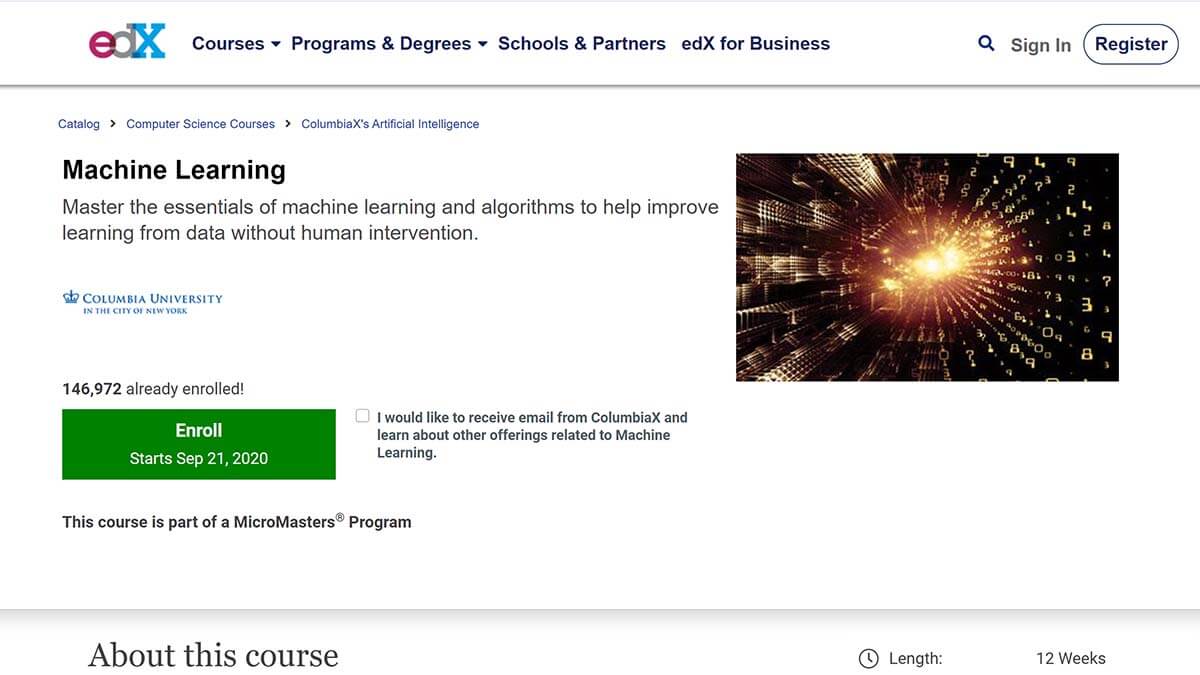
- Course instructor is very knowledgeable
- Class lessons are free to access
- Led by Columbia University
Cons
- Numerous prerequisite skills required
Students who wish to take edx’s “Machine Learning” course should have knowledge in calculus, linear algebra, probability, statistical concepts, and basic coding & data manipulation.
The creator of this course, John W. Paisley, is a researcher who has focused his efforts on statistical machine learning, and this also shows itself in the course material. In this course, John takes his extensive knowledge on the topic of statistical machine learning and passes it on to the students. If you are interested in the inner working of statistical machine learning, then you will find this course best suited for you.
Supervised learning techniques for regression and classification are covered in the first half of the course, while the second half focuses on unsupervised learning tools and techniques. Although this course is mostly focused on theory rather than practice, it does show some excellent real-life examples in order to make the theory easier to grasp for the students.
Some of the lectures covered in this online course are:
- Probabilistic & non-probabilistic viewpoints
- Optimization & inference algorithms for model learning
- Data modeling & analysis
This machine learning course goes very deeply into the field of statistical machine learning, and it tends to focus more on theory rather than practice. The theoretical nature of the lectures could cause some students to shy away after a few sessions, but those who do stick around get to develop true expertise in a very promising direction of machine learning. If you’re capable of handling 3 months of advanced theory in machine learning, then you will definitely stand to benefit from John’s teachings. His expertise in the field of statistical machine learning is unparalleled, and while his course is not the most beginner-friendly, it IS one of the most resourceful.
Machine Learning Crash Course (Google)
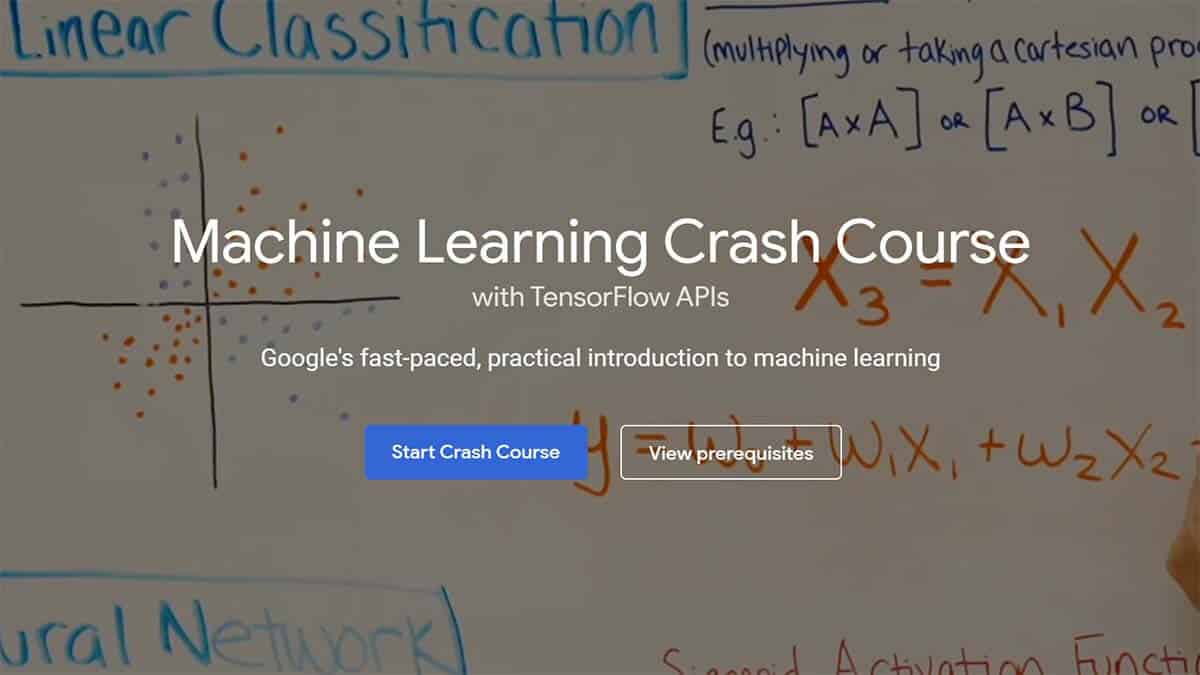
- Excellent self-study guide about machine learning
- Presented in various methods
- Good mixture of practical and theory exercises
Cons
- Not very useful for machine learning specialists
This course is for those of you who have knowledge in basic algebra and programming and want to learn machine learning online for free.
As the “crash course” name implies, this program is a brief introduction into the world of machine learning. It will explain to you what’s the value of machine learning and what are the core principles that make it work. The course also gives learners a quick overview of the more advanced concepts of machine learning such as building multi-class neural networks.
The “Machine Learning Crash Course” will not be enough by itself to develop full expertise in machine learning. However, due to its introductory nature and free pricing, it still serves a very important role on this list. The course material will get you up to date with the fundamentals of machine learning, and you will develop a better understanding of whether machine learning is the right career choice for you. Without question, the Machine Learning Crash Course by Google is one of the best free machine learning courses available, despite its relatively short duration.
Bayesian Machine Learning in Python: A/B Testing (Udemy)
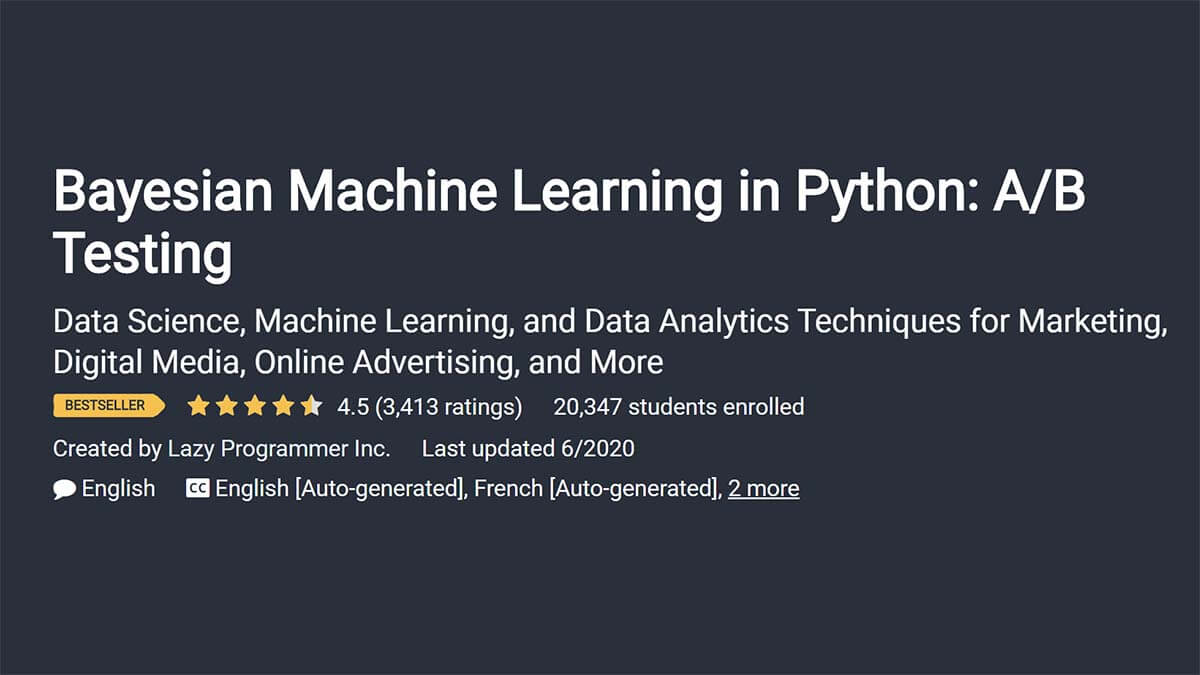
New customer offer! Top courses from $14.99 when you first visit Udemy (expires 31 March 2024).
- Excellent self-study guide about machine learning
- Focus on A/B testing for data insight
- Explains the tools used in the Bayesian method
Cons
- Does not fully cover the fundamentals of machine learning
For software engineers looking to combine machine learning with marketing, the “Bayesian Machine Learning in Python: A/B Testing” course from Udemy is perfect for the job. In addition, this course is a good match for any Python programmers looking to refine their comparison algorithms.
This program focuses on the integration of the Bayesian machine learning method into traditional A/B testing, allowing your programs to make more sense out of two data sets. Filled with simple explanations and further readings on how these can affect marketing strategies, this course gets to the bottom of how probability factors into machine learning.
Savvy marketers will understand the importance of integrating machine learning into their strategies, and this online course is one of the best resources for information on this topic. The course material will be difficult to chew through for marketers without any technical background, but those who do manage to complete the curriculum will be one leap ahead of the competition. It’s a high-quality course throughout, but it’s best suited for a niche audience of students who want to combine marketing with machine learning.




